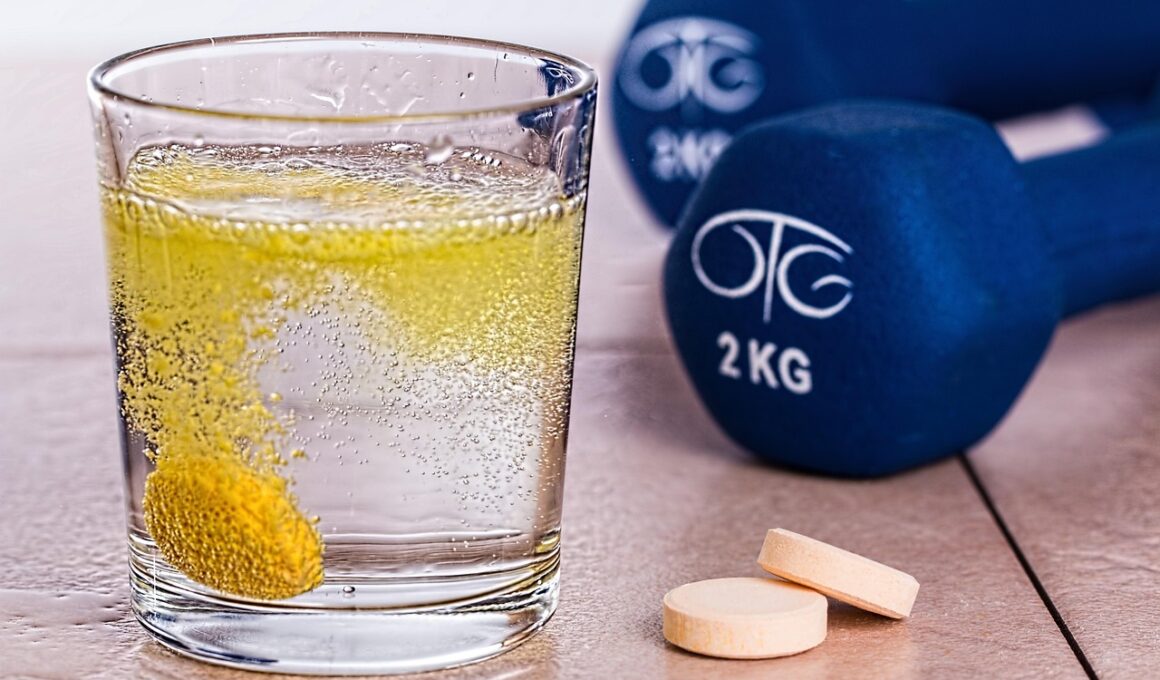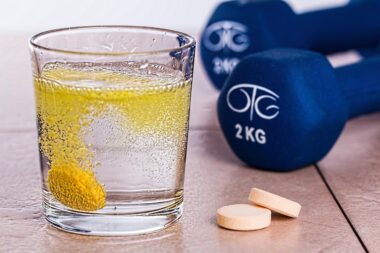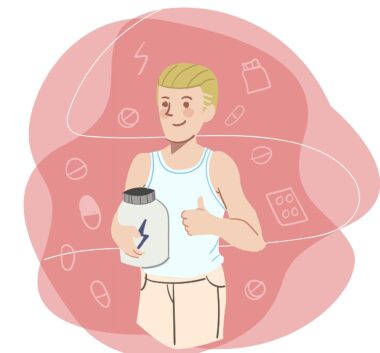The Link Between Post-Workout Nutrition and Reduced Muscle Soreness
Understanding the relationship between post-workout nutrition and muscle soreness is vital for athletes and fitness enthusiasts alike. After an intense workout, your body undergoes significant stress, leading to muscle micro-tears. This process is essential for muscle growth, but it can also cause soreness. Eating the right foods after exercise can help minimize this soreness. Nutrients such as proteins and carbohydrates play crucial roles in recovery. Proteins help repair muscle tissues, while carbohydrates replenish glycogen stores that provide energy for future workouts. Moreover, incorporating healthy fats into your post-workout meal can further support muscle recovery. It’s essential to focus on a balanced meal that combines these macronutrients effectively. Timing your post-workout nutrition is equally important, as consuming a nutritious meal or snack within 30 minutes to two hours post-exercise can maximize recovery. Hydration also plays a significant role in preventing muscle soreness and enhancing performance. Ensuring proper fluid intake can help facilitate blood circulation and nutrient delivery to your muscles, thereby aiding recovery. Overall, investing in post-workout nutrition can significantly reduce muscle soreness and improve athletic performance over time.
One of the most effective ways to reduce delayed onset muscle soreness, commonly called DOMS, is through proper nutrient intake. When you perform strenuous exercises, especially resistance training, tiny tears occur in muscle fibers. This process is completely normal, but adequate recovery is necessary to avoid long-term damage. Post-workout meals rich in protein can stimulate muscle protein synthesis and contribute directly to the healing process. Additionally, carbohydrate-rich foods replenish glycogen levels, which can be severely depleted during workouts. Both macronutrients serve as the foundation for recovery and soreness reduction. Including vitamins and minerals in your post-workout diet also plays a key role. For example, vitamin C supports collagen production, while magnesium aids in muscle relaxation. Antioxidant-rich foods can combat oxidative stress caused by intense workouts, further alleviating muscle soreness. Foods like berries, leafy greens, and nuts can enhance your post-workout nutrition. A well-rounded approach to meal selection is ideal. Planning meals ahead ensures that you get the nutrients necessary, making it easier to adhere to your recovery protocol. The goal is to support your body efficiently and minimize discomfort during subsequent workouts.
Our body’s response to exercise can vary significantly depending on several factors, including workout intensity, type, and duration. However, nutrition remains a controllable factor that can considerably influence recovery outcomes. For instance, consuming a blend of fast-digesting proteins, like whey protein, after workouts can increase the rate of muscle recovery optimally. Research shows that protein synthesis peaks several hours post-exercise, meaning the sooner you provide the building blocks of muscle repair, the better off you’ll be. Carbohydrates also play an essential role; they not only provide energy but also assist in the recovery process by enhancing insulin sensitivity. Insulin helps transport nutrients into cells, making carbohydrates a crucial component of recovery meals. Plant-based options, like quinoa and brown rice, coupled with a protein source like chicken or tofu, can balance macronutrient needs efficiently. Also, don’t forget about the importance of hydration after workouts. Be sure to drink sufficiently water or electrolyte beverages to restore fluid balance. Staying hydrated can help eliminate waste products from muscle damage and enhance muscle repair. Ultimately, finding the right nutrition combinations can lead to more effective recovery, allowing for a more productive training cycle.
The Role of Timing in Post-Workout Nutrition
One critical element of post-workout nutrition that cannot be overlooked is timing. Consuming nutrients shortly after exercising, ideally within 30 minutes, is known as the “anabolic window.” This period represents an exceptional opportunity for your body to maximize nutrient absorption, aiding muscle repair and growth. During this time, your body is particularly receptive to glycogen replenishment and protein synthesis, making quick access to proteins and carbs crucial. Having a shake or snack readily available after workouts can provide a convenient solution. Pre-made protein shakes, banana with nut butter, or yogurt parfaits are excellent choices. Furthermore, neglecting to refuel soon after workouts risks muscle deterioration, hindered recovery, and prolonged soreness. If meals are missed post-exercise, it can lead to increased muscle breakdown rather than repair. Planning and packing meals and snacks ahead of time after workouts ensures you target this anabolic window effectively. Monitoring your recovery by tracking post-workout nutritional habits can provide insights into how well your body is recovering. Experimenting with various foods and combinations of macro and micronutrients can help you find the best routine for optimal recovery and reduced soreness.
Incorporating anti-inflammatory foods into your post-workout nutrition can significantly boost recovery and alleviate soreness. In the aftermath of an intense workout, your body faces inflammation, which, if prolonged, can lead to increased soreness and longer recovery times. Foods rich in omega-3 fatty acids, such as fatty fish, flaxseeds, and walnuts, have proven anti-inflammatory properties. These fats not only reduce inflammation but also promote joint health and cognitive function. Additionally, spices like turmeric and ginger are known for their strong anti-inflammatory effects. Including them in your post-workout meals can add flavor while assisting recovery. Fruits and vegetables, particularly those with strong colorful pigments, like berries, cherries, or leafy greens, can provide antioxidants that combat oxidative stress and reduce inflammation. Anti-inflammatory smoothies incorporating these ingredients can also be a quick and easy post-workout option. Staying conscious of inflammation levels while planning your recovery meals can enhance muscle healing and an overall sense of well-being. With these incorporated, you will form a more potent post-workout nutrition strategy to optimize your recovery and enhance your performance.
To maximize the benefits of post-workout nutrition, meticulous meal planning is essential. Both athletes and casual fitness enthusiasts should establish a consistent system to ensure they’re nourished adequately. This could involve meal prepping at the beginning of the week or creating a shopping list dedicated to recovery-focused foods. Adopting this proactive approach alleviates the last-minute rush that often leads to suboptimal food choices. Having a range of protein options, including lean meats, dairy, legumes, and plant-based proteins, can inspire variety. Similarly, stocking up on healthy carbohydrate sources—such as whole grains and starchy vegetables—ensures you meet your body’s energy needs effectively. It’s also wise to incorporate nutrient-dense snacks into your post-workout routine. For example, pairing protein shakes with nuts or granola bars can provide quick nourishment that promotes muscle repair while curbing hunger. Additionally, utilizing tracking methods, like food diaries and apps, can offer insights into diet patterns surrounding post-workout meals. These habits will not only refine your recovery program but also help cultivate a long-term healthy lifestyle. Ultimately, strategy and consistency is crucial for effective post-workout nutrition.
Conclusion: Optimizing Recovery Through Nutrition
Prioritizing post-workout nutrition is fundamental for any individual seeking to minimize muscle soreness and accelerate recovery. Engaging in proper nutritional practices can enhance performance and elevate your overall fitness experience. Compliance with nutrient timing, incorporation of macronutrients, and selecting anti-inflammatory options can collectively serve to support muscle recovery dynamics. As our body adapts to workouts over time, so should our nutrition strategies evolve with it. It’s crucial to listen to your body’s cues and adjust your meal plans according to your workout routines and personal recovery needs. Assessing personal performance metrics, such as soreness levels and recovery times, can assist in refining these nutritional approaches. Engaging with sports nutrition specialists may also offer personalized strategies fitted to individual goals and lifestyles. Finally, as you put these principles into practice, remember to remain patient. Recovery is a gradual process, and optimizing post-workout nutrition can ensure longevity in your fitness journey. Embracing the journey to enhance nutrition and muscle recovery will set the stage for a healthier relationship with training and the overall pursuit of your athletic aspirations.
In conclusion, taking control of your post-workout nutrition can be one of the smartest decisions for your fitness journey. Whether you are a seasoned athlete or beginning your fitness path, understanding how to fuel your body post-exercise is paramount. The choices you make regarding post-exercise meals can impact performance, recovery, and muscle soreness. Embracing a holistic approach toward nutrition that combines complex carbohydrates, quality protein sources, and micronutrient-rich foods can help shape your overall wellness. The consistent application of nutrition principles in your daily routine paves the way for substantial, long-term results. Make it a point to educate yourself about the best food choices that aid recovery and promote muscle repair. This can not only improve your workout outcomes but will also enhance your enjoyment of fitness as a whole. Building a custom strategy, tailored to your individual needs and goals, can steer you in the right direction. As you continue your fitness journey, remember to prioritize nutrition—it is the key to unlocking your full potential.





